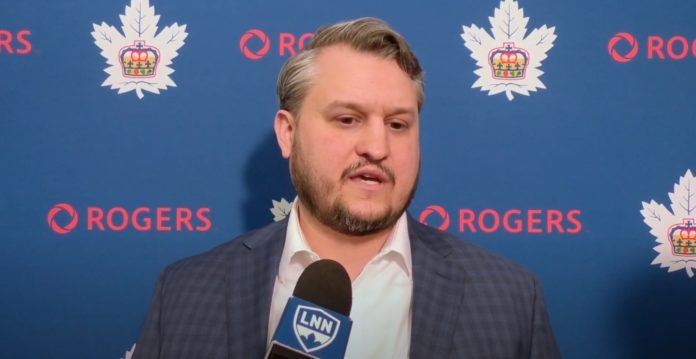
Toronto Marlies General Manager addressed the media on locker cleanout day to discuss the team falling one point shy of the playoffs, the signing of Curtis Douglas and Bobby McMann to NHL contracts, and Greg Moore’s development as a head coach.
Bobby McMann and Curtis Douglas came into the season on AHL deals and ended up signing an NHL contract. What stood out to you about them this year?
Hardy: They have a lot of similarities in that they are young players who came in. Experience-wise, I was looking, and I think our three centers that we most primarily deployed were Douglas, SDA, and Abramov. I looked and they had a combined 17 AHL games. They were carrying the mail for us down the middle, which was impressive.
For Bobby and Curtis in particular, it is their work ethic, their mindset of wanting to get information from the staff, wanting to apply the information they’re given, a hunger to compete, a hunger to continue to grow, and a willingness to get better every day.
For Curtis, he came in here and got a lot of confidence early. He probably produced to a level that I didn’t expect. I thought his offensive productivity was quite impressive. I also felt his competitiveness and ability to fight — I watched some of those things in real-time, and I was certainly glad I wasn’t at the other end of those events.
You look at him and start to project what he could be as he continues. He is a young kid who is 22 years old with a 6’8 body. It is going to be two, three, four, five years before he fully grows into his body and becomes what he will be. If we can have patience with a player like that, when he gets to be 24 or 25 years old with all that he brings, he can be a tremendous asset to this organization.
Bobby McMann is one of the great stories of the team. When I spoke to him earlier on, we expected a couple of more forwards to clear waivers and come down here. Our team may have had a little bit of a different makeup. With the injury to Nick Robertson early, our team started to change. When I met with him early, I challenged him. I said, “I love your work ethic. I love your mindset. I love the power that you bring. I want you to continue to evolve your game, make more east-west plays, and be a little more creative.”
He got the opportunity to come back really quick and, quite frankly, made me look a little foolish. He and I have had a laugh about that a couple of times. For him to come in here and break the rookie record for scoring just speaks to the quality of person he is.
It comes back to the same things. It is a foundation of consistency and work ethic every day — a consistent mindset, a desire to improve, a desire to grow, and a desire to compete. If we could take from Bobby McMann and inject what he is made of into all of our players, I think that we will have a great deal of success going forward.
Looking back at the team and where it could have improved to get that last playoff spot, what do you see?
Hardy: The team came a long way throughout the year. If you look at the growth of the individual players in the model that we are building with the development team in collaboration with the coaches — which is really one unit — that was all positive.
Any time you fall one point short of making the playoffs, you can always look back, really, at every game and identify some different things or reflect back on some adversity that occurred throughout the season. But the reality is that everybody goes through adversity. It is part of this level and part of professional sports.
Looking back, there are definitely things we will reflect upon, refine some processes, and improve some things going forward as we try to get better, continue to put a good product on the ice, and continue to allow our players to grow throughout the season and into next season.
What are your thoughts on the growth of Greg Moore as a head coach in the league?
Hardy: Greg and I have a relationship prior from working together in Chicago. In the five years that it has been since our first year together, I have seen a lot of growth in him this season.
A lot of times, from an outside observer, you recognize the games and the outcomes. Everybody wants to make the playoffs, and that is certainly part of the job, but the main job of our head coach is fostering an environment for the development of our players where we continue to move players on to the Toronto Maple Leafs.
We had a lot of callups this year. We had a lot of guys that went in and did a nice job. We also had a lot of guys that came in here as first-year professionals and made some huge strides so that they will be knocking on the door next year and into the year after.
There is an opportunity for all of us, myself included, to continue to grow and continue to improve, but if we keep moving on the track that we are on, I think good things will happen for our young players. As we get more and more experience for these young players, good things will happen for our team moving forward.
It is often said that managing in the AHL is one of the hardest levels to manage. What did you learn about the AHL this year that might make that statement ring true?
Hardy: With the incredible amount of roster turnover and balancing act… I can’t think of any level of hockey that I have been at before where the primary focus is the development of the players. You are trying to create an environment and culture where you certainly want to win and have success — everybody wants to win — but just balancing the development piece with the winning and making sure we are getting the right amount of opportunity for our young players who are the future of the Toronto Maple Leafs.
That is first and foremost. That was the biggest adjustment. Led by Rich Clune and the players and staff we have here, it wasn’t an overly difficult transition in that way. We laid out in the beginning when we all met here that we wanted to invest in young players. We wanted to develop them. We were going to rely on Rich Clune. We wanted to create a culture where players wanted to be, felt they were valued, and felt they were getting better.
As you talk to players here on the way out of town, it seems to be a common thread that runs throughout the group. People did feel that. As we continue to build on that foundation that we started to set this year going forward, we will benefit from that for sure. I certainly will as I grow in my role.
Josh Ho-Sang said at the start of the year that he would tape sticks to be in this organization. What did you see in his growth throughout the year?
Hardy: I think Josh and I spent an incredible amount of time together talking about hockey and talking about life. He is a young person that has a very unique perspective on a lot of things. He thinks about a lot of things in a different way than hockey players traditionally do.
To me, I was really happy. His last game against Belleville was his best game. He was competitive and consistent in his effort throughout the game and the flashes of dynamic traits that he has started to shine through.
It is a great opportunity. Meeting with Josh earlier today, he hadn’t played a lot of hockey in his last couple of years. He had been kind of bouncing around and doing different things. It felt like he set a foundation going forward for him that can continue to build on and grow.
For me, managing the team, he is a quality young person. I enjoyed working with him.
A lot of players said they found great comfort in this room. What stood out to you about this team that allowed them to be so comfortable? Greg Moore talked about Rich Clune being a big aspect of it.
Hardy: One of the things, reflecting on the earlier question, maybe it is dialing back that level of comfortability and finding a little bit greater degree of intensity and consistency day-to-day.
But I think that there is a lot of pressure on young players mentally, physically, and emotionally when transitioning to pro hockey coming from junior or college. It does start with Dicky. It starts with Greg and our coaching staff. We want to have an environment where people are feeling valued as human beings and feeling valued knowing they are going to come in and make mistakes. We made a lot of them throughout the season, but they are opportunities to grow.
You make a mistake? You meet with the coaching staff, you meet with the development team, and we continue to work on the individual development plans we have outlined for the players. We have open dialogue where we treat them like human beings and they are able to say anything they want to say and speak candidly on items.
It is a process where we work with them and grow. I think it is very important. This is a very difficult league in that, quite frankly, every player that is on the team aspires to be on another team. There is nowhere else where that type of thing exists.
To get through a 72-game season — and then, hopefully, make a deep run in the playoffs next year — you have to have a place where people feel valued, want to come to work, and really enjoy the work they’re doing and the people they are working with. That is something that we try to instill in them every day.


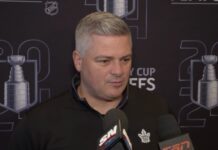
![Sheldon Keefe Post Game, Leafs 3 vs. Bruins 2: “I loved [the Matthews] line, and I loved a lot about our game all the way through the lineup” Sheldon Keefe, Toronto Maple Leafs post game](https://mapleleafshotstove.com/wp-content/uploads/2024/04/keefe-pg-game-1-218x150.jpg)
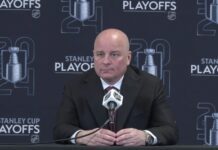

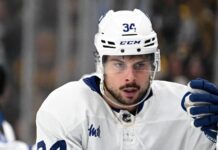



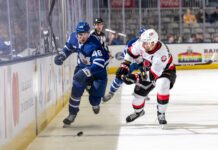


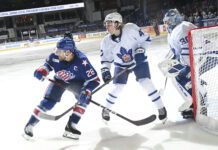











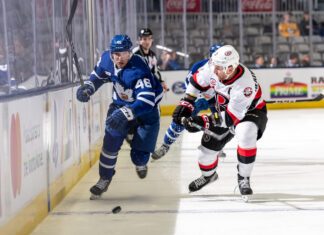



![Sheldon Keefe Post Game, Leafs 3 vs. Bruins 2: “I loved [the Matthews] line, and I loved a lot about our game all the way through the lineup” Sheldon Keefe, Toronto Maple Leafs post game](https://mapleleafshotstove.com/wp-content/uploads/2024/04/keefe-pg-game-1-100x70.jpg)




![Jim Montgomery on adjustments for Game 2 vs. the Maple Leafs: “We need to spend more time in the offensive zone… We didn’t do a good job offensively at five-on-five [in Game 1]” Jim Montgomery, Boston Bruins practice](https://mapleleafshotstove.com/wp-content/uploads/2024/04/jim-montgomery-bruins-100x70.jpg)